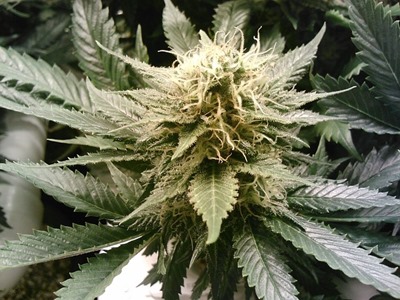
The WSJ India Real Time has written an excellent post explaining how exactly bhang – a milky, sweet drink laced with copious amounts of cannabis, which is traditionally consumed today for the Holi festival – is legal in India.
In short, it’s down to a loophole in the drug laws that does not ban the consumption of cannabis leaves, only its buds and resin (i.e., hashish or hash oil, which typically contain a higher concentration of cannabis’ active ingredient than the leaves).
The Narcotic Drugs and Psychotropic Substances Act 1985
2 (iii) "cannabis (hemp)" means-
(a) charas, that is, the separated resin, in whatever form, whether crude or purified, obtained from the cannabis plant and also includes concentrated preparation and resin known as hashish oil or liquid hashish;
(b) ganja, that is, the flowering or fruiting tops of the cannabis plant (excluding the seeds and leaves when not accompanied by the tops), by whatever name they may be known or designated; and
(c) any mixture, with or without any neutral material, of any of the above forms of cannabis or any drink prepared therefrom;
(iv) "cannabis plant" means any plant of the genus cannabis;
However, growing cannabis is illegal under section 2(viiia), which includes in the definition of “illicit traffic” the cultivation of “any cannabis plant”.
Harvesting cannabis plant leaves in the wild, is not covered.
And, reports the WSJ, the legality of bhang has been unsuccessfully challenged in court numerous times.
Arjun Singh v State of Haryana 2004
According to the high court in Chandigarh, confirming the above, bhang is not “cannabis (hemp)” under the act, but it is a “cannabis plant”.
Under the restrictions of the law, it’s therefore not illegal to consume cannabis leaves, but it is illegal to grow the plant.
The judge said (in overly complex language below, so skip the below if you’ve just come back from playing Holi):
It is apparent from aforesaid two enactments that under Act No. 2 of 1950 Charas, Ganja and Bhang are included within the definition of cannabis (hemp) whereas under N.D.P.S. Act bhang is excluded. Bhang does not fall within the definition of cannabis (hemp) as defined under Section 2(iii) of N.D.P.S. Act.
It is also to be noticed that under Act No. 2 of 1950 cultivation of only cannabis (hemp) plant i.e. Charas, Ganja and Bhang is an offence under Section 54(b) and punishable under Section 54(g)of the said Act whereas under N. D. P. S. Act cultivation of any cannabis plant, which means any plant of the genus cannabis as defined under Section 2(iv) of N.D.P.S. Act, is punishable under Section 20(a) read with Section 20(b)(l) of the said Act.
In my humble opinion although bhang is excluded from the definition of cannabis (hemp) under the N.D.P.S. Act yet it does fall within the definition of cannabis plant and as such its cultivation is punishable under Section 20(a) read with Section 20(b)(i) of the said Act.
I am also of the opinion that cannabis (hemp) is one of the species of cannabis plant, therefore, it cannot be held that since 'Bhang' is excluded from the definition of cannabis (hemp) under the N.D.P.S. Act one of the species of cannabis plant, therefore, its cultivation is not an offence and it is not punishable under Section 20(b)(i) of the said Act.
14. In my considered opinion cultivation of 'Bhang' is punishable under N.D.P.S. Act although it is not included within the definition of cannabis (hemp) and not Act No. 2 of 1950 within the meaning of Article 254 of the Constitution of India. As regards cultivation of Bhang is concerned, the N.D.P.S. Act would prevail over Act No. 2 of 1950 and latter enactment passed by the Legislature of State shall be deemed to be repugnant and void to the extent of its inconsistency to the former enactment passed by parliament
State laws
That said, each state may also have its own local rules and restrictions.
For instance, under Uttar Pradesh excise rules, as reported by WSJ, there’s a potential prison term of two years and payment of a fine if someone:
(a) imports, exports, transports or possess any intoxicant other than charas; or
(b) cultivated any hemp plant (cannabis sativa); or
(c) collects or sells any portion of the hemp plant (cannabis sativa); or
(d) collects or sells any portion of the hemp plant (cannabis sativa) from which any intoxication drug can be
manufactured
Therefore, consumer beware in state-to-state.
Isn’t it basically legal in the US now?
While in the vast majority of countries marijuana sale and consumption is illegal, Uruguay and several states in the US have legalised the cultivation of the drug for recreational or medicinal use in recent years.
The Netherlands has long operated a policy where the police would not prosecute cannabis use and sale under certain strict circumstances.
However, the Single Convention on Narcotic Drugs technically prohibits countries from legalising cannabis, except for medicinal use.
threads most popular
thread most upvoted
comment newest
first oldest
first
Another question is, whether all the quantities of cannabis consumed on Holi is actually just collected in the wild, or whether most of it is in reality procured through proper (illegal) farming of cannabis.
Also, you're right on excise, there are potential issues here - WSJ article linked to the UP state excise rules: www.upexcise.in/pdfs/part1/Chapter-X.pdf
Have updated.
"Bhang is legal. Mayur.
Go check that out .
Major difference is flowering or fruiting should be without tops.
Thanks for watching.
threads most popular
thread most upvoted
comment newest
first oldest
first